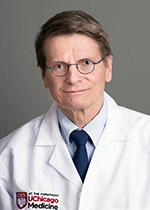ARCHIVED: NOT AVAILABLE FOR CREDIT
Investigating and Managing Infectious Diseases in the Microbiome Era
Extensive research has elucidated the influence of the gut microbiota on human health and disease susceptibility and resistance. This presentation will review recent clinical and laboratory-based experimental studies associating the gut microbiota with resistance to infections and will consider opportunities and challenges in translating microbiome research from and to the bedside.
Originally published on October 10, 2022
Lecture Presenter
 | Eric G. Pamer, MD Director |
Dr. Pamer received his MD degree from Case Western Reserve University Medical School and completed clinical training in internal medicine and infectious diseases at UCSD Medical Center. He was a postdoctoral fellow with Charles E. Davis at UCSD, Maggie So at Scripps Research Institute, and Michael Bevan at the University of Washington and then moved to Yale University and established a laboratory focusing on immune responses to microbial infection. In 2000, Dr. Pamer moved his laboratory to Memorial Sloan-Kettering Cancer Center in New York where he was the chief of Infectious Diseases, head of the Division of Subspecialty Medicine, and Director of the Center for Microbes, Inflammation, and Cancer, which focused on the role of the microbiome in the treatment of cancer. In 2019, Dr. Pamer moved to the University of Chicago to become the director of the Duchossois Family Institute. Dr. Pamer’s research focuses on the impact of the intestinal microbiota on resistance to vancomycin-resistant Enterococcus faecium, Clostridioides difficile, and Klebsiella pneumoniae infections. The Pamer laboratory also investigates the role of inflammatory monocytes in defense against infection and the interaction between intestinal microbes and the mammalian immune system.
Objectives
After this presentation, participants will be able to:
- Describe the impact of complex medical care on the intestinal microbiome
- Discuss approaches to correct microbiome losses that occur following antibiotic treatments
Sponsored by:
University of Utah School of Medicine, Department of Pathology, and ARUP Laboratories
 Site Search
Site Search

